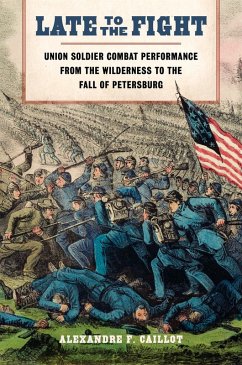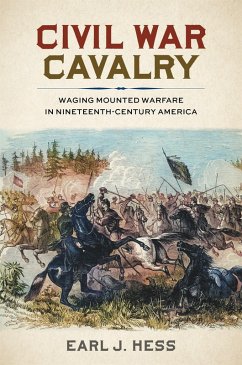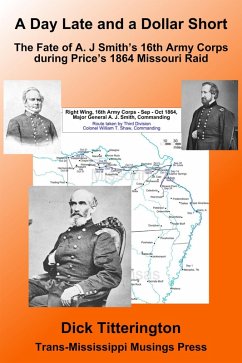
The Confederate Resurgence of 1864 (eBook, ePUB)

PAYBACK Punkte
8 °P sammeln!
William Marvel's The Confederate Resurgence of 1864 examines a dozen understudied Confederate and Union military operations carried out during the winter and spring of 1864 that, taken cumulatively, greatly revived white southerners' hopes for independence. Among the pivotal moments during this period were the sinking of the USS Housatonic by the CSS Hunley; Nathan Bedford Forrest's defeat of William Sooy Smith's cavalry raid; and the Confederate army's victory at Olustee, Florida. The repulse of Union advances on Dalton, Georgia; botched Union raids on Richmond; and the capture of the Union g...
William Marvel's The Confederate Resurgence of 1864 examines a dozen understudied Confederate and Union military operations carried out during the winter and spring of 1864 that, taken cumulatively, greatly revived white southerners' hopes for independence. Among the pivotal moments during this period were the sinking of the USS Housatonic by the CSS Hunley; Nathan Bedford Forrest's defeat of William Sooy Smith's cavalry raid; and the Confederate army's victory at Olustee, Florida. The repulse of Union advances on Dalton, Georgia; botched Union raids on Richmond; and the capture of the Union garrison in Plymouth, North Carolina, likewise suggested that the tide of fighting had turned toward the Confederate cause. These events boosted the morale of southern troops and citizens, and caused grave concerns about the war effort in the North and in the mind of Abraham Lincoln.
In late 1863 and early 1864, dejection and despair prevailed in the South: Union soldiers had vanquished Robert E. Lee at Gettysburg, the Confederate nation had been cut in two, Tennessee was lost, and Braxton Bragg's army had been utterly routed at Chattanooga. Defeatism loomed in the South during the first weeks of 1864, and the ease with which William T. Sherman rampaged across Mississippi illustrated the dominance of Union forces, while Confederates' ineffectual assault on New Bern accentuated their weakness. Yet between February 20 and April 30, southern troops enjoyed an unbroken string of successes that included turning back a concerted Union offensive during the Red River campaign as well as Forrest's incursions into Union City, Paducah, and Fort Pillow. Aided by flawed strategy implemented by Union army officers, the achievements of Confederate forces restored hope and confidence in camp and on the southern home front.
The Confederacy's battlefield successes during the early months of 1864 remained almost unnoticed by Civil War scholars until recently and have never been studied collectively for their impact on Confederate morale. The victories invigorated southern combatants, demonstrating how abruptly the most dismal military prospects could be reversed. Without that experience, Marvel argues, the Confederates who faced Sherman and Grant in the spring of that year would certainly have displayed less ferocity and likely would have succumbed more quickly to the demoralization that ultimately led to the collapse of Confederate resistance.
In late 1863 and early 1864, dejection and despair prevailed in the South: Union soldiers had vanquished Robert E. Lee at Gettysburg, the Confederate nation had been cut in two, Tennessee was lost, and Braxton Bragg's army had been utterly routed at Chattanooga. Defeatism loomed in the South during the first weeks of 1864, and the ease with which William T. Sherman rampaged across Mississippi illustrated the dominance of Union forces, while Confederates' ineffectual assault on New Bern accentuated their weakness. Yet between February 20 and April 30, southern troops enjoyed an unbroken string of successes that included turning back a concerted Union offensive during the Red River campaign as well as Forrest's incursions into Union City, Paducah, and Fort Pillow. Aided by flawed strategy implemented by Union army officers, the achievements of Confederate forces restored hope and confidence in camp and on the southern home front.
The Confederacy's battlefield successes during the early months of 1864 remained almost unnoticed by Civil War scholars until recently and have never been studied collectively for their impact on Confederate morale. The victories invigorated southern combatants, demonstrating how abruptly the most dismal military prospects could be reversed. Without that experience, Marvel argues, the Confederates who faced Sherman and Grant in the spring of that year would certainly have displayed less ferocity and likely would have succumbed more quickly to the demoralization that ultimately led to the collapse of Confederate resistance.
Dieser Download kann aus rechtlichen Gründen nur mit Rechnungsadresse in A, D ausgeliefert werden.













